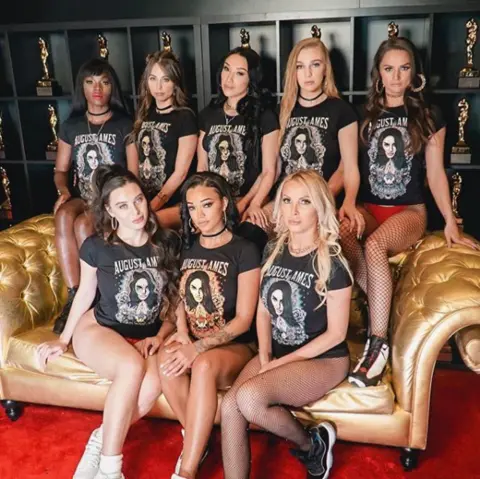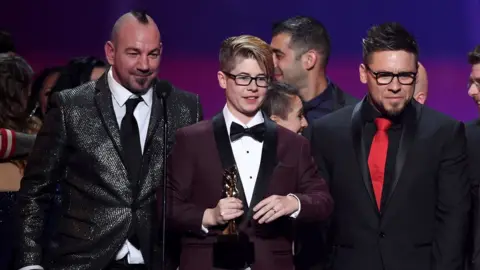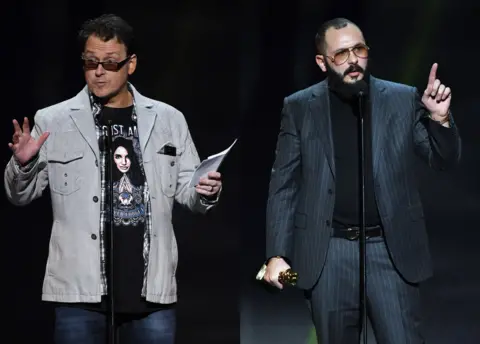Porn stars call for respect after spate of deaths
 VIXEN.com
VIXEN.comThe deaths of five young women in the space of three months has shocked the adult entertainment industry. Now female performers are calling for support and respect.
First it was Shyla Stylez, who died while visiting family from unknown reasons in November. Then in December, August Ames killed herself. Shortly after, three other porn actresses - Yurizan Beltran, Olivia Nova and Olivia Lua - died within weeks of each other, either from suspected drug overdoses or unexplained reasons.
What had started as a call to action to support female performers struggling with mental health, drug addiction and cyberbullying, now felt to many in the industry like a full-on crisis. Was the industry doing enough to prevent these kinds of deaths?
"We need to fight the stigma as a group, because we've all been under attack," says Tori Black, a two-time Female Performer of the Year at the AVN Awards, the Academy Awards of the adult movie business,
"What happened to these girls could have happened to any one of us on a weak moment."
While there has long been a stigma around porn, actresses say that social media has raised the stakes.
Social platforms have given performers new opportunities to control their careers, but also exposes them to trolling and de-humanising comments more often.
You might also like:
Black, who returned to acting in porn after taking a seven-year hiatus to focus on her family, says while most of her social media interactions are positive, she still faces negative comments.
"I'm a mother and a porn star, and that's very complicated," she says. "I could post the most innocent, fully-clothed everyday picture on Instagram and someone would comment 'Aren't you ashamed? You have children!',"
For Black, "haters" and trolls aren't the consequence of increased popularity, but amplified voices of very old prejudices that consider sexuality degrading. Only by gradually changing that culture, says Black, performers can finally earn the respect they deserve.
"We chose this industry because sex is something that moves us and we're passionate about, just like a musician would go to music," she says.
Adult performers also argue the stigma surrounding sex workers has a direct effect on their ability to receive help.
Therapists and other professionals are likely to treat the fact they work in porn as the cause of their problems, rather than a profession, says Tasha Reign, the chairwoman of the Adult Performer Advocacy Committee.
"Anybody who is told over and over again that what they do is not okay start to really believe it, even if they don't want to," she says.
But Reign says there has to be change from inside the industry as well.
 Getty Images
Getty Images"These deaths have brought awareness and empathy from the outside," she says, "but there are many things the industry can do to make it a better place for young women".
Reign and the APAC are trying to implement a mandatory training protocol for new performers, to make sure they are aware of their rights.
The group has a "stamp" for mental health and other professionals who meet their criteria for "safe, sex worker-positive, and non-discriminatory services".
Reign is also personally supportive on rising the entry age from 18 to 21.
Complicating these efforts is the fact the porn industry went through major changes - the advent of popular video-sharing sites meant cheaper, often more degrading, content survived and wages fell.
The workforce is fragmented, and a feast-or-famine gig structure has further increased pressure on performers.
For the actresses, this new world of free and often pirated content added another layer of complexity to their feelings towards their profession, including being pushed outside of their comfort zones, sometimes having to take on roles they wouldn't have otherwise taken.
The porn industry has also had their own #MeToo moment, with numerous allegations of sexual assault on-set and off. Another industry group has developed a checklist directors can use to clarify what performers are and are not comfortable with on set.
Other women are taking control by switching roles and moving behind the camera.
 Getty Images
Getty ImagesAngela White, who is both an actress and director, won a record-breaking 14 AVN Awards this year. She says there's a "large positive shift within the industry" to more women producing and directing their own content and "to represent women as powerful sexual beings".
This year, half of the 10 titles contending for Movie of the Year at the AVN Awards were directed or co-directed by women, compared with only one out of 10 Oscar nominees.
Director Greg Lansky argues that a big part of his studios' success comes from building the brands' image around strong women - who he is adamant to call artists.
"Language is very important," says Lansky. "We need to drive the adult industry and its people forward, out of the shadows," he adds.
 Getty Images
Getty ImagesAfter Lansky won his third consecutive Director of the Year award this year, he left the stage to producer Kevin Moore - widower of August Ames - to announce a support programme for female performers in memory of his late wife.
The August Project, Moore said, would be "a support system tailored for the performers in this industry. It will be a resource so that if any of you find yourself on the edge of a cliff, help is a phone call away".
"There can never be another AVN awards show that has a memorial full of young women, ever again."